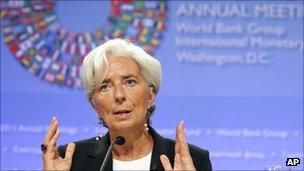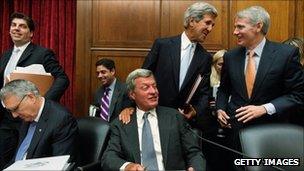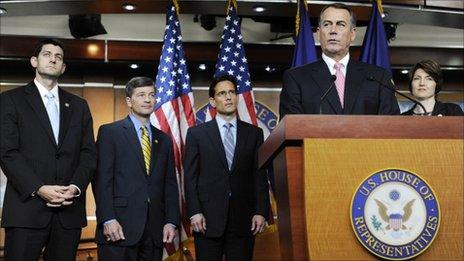IMF economy warnings: Time to panic?
- Published
- comments

Christine Lagarde, managing director of the IMF, says the window for action is narrowing
When the dramatic becomes wearisomely familiar, maybe it is time to panic.
With the IMF meeting in Washington we again have a parade of world leaders issuing dire warnings about the state of the economy. Again, they exhort their colleagues to take firm political action, to prevent what is already bad from getting worse.
Christine Lagarde, the new IMF boss, says this is a "dangerous phase, external" and while there is a path to recovery, it is narrower than three years ago.
She says the US must repair its broken finances and reduce debt, while balancing that with growth creation.
This feels like a critical moment. Not simply today, nor this week, but the next few months will be a test of political systems in Europe and the US.
The short-term problem is that just talking about all this makes it worse, as we've seen with the Federal Reserve's attempt to "twist".
Dr Fed decided that the patient was more seriously ill than we'd thought. So he came up with new stronger medicine. The problem is that the markets, like relatives around the sickbed, heard the diagnosis with alarm, external and discounted the new prescription.
No one seems to doubt that what is needed is firm political action.
"The two other clouds still over us are the European crisis and the deep concern that you can see across the world and around the country about whether the political system in the United States is up to the challenges we face," warned US Treasury Secretary Tim Geithner, external.
But there is something false about the picture being painted of weak leaders who can't quite summon up the energy to do something.
The problem isn't really the lack of political will, it is the lack of political agreement.
In America, President Obama believes he knows what to do. He has a plan to promote growth, external, but its mixture of stimulus spending and increased taxation is anathema to the Republican-controlled House of Representatives.

The bicameral, bipartisan 'super-committee' has differing views on how to reduce the US debt
The Republicans also know what to do. They would slash spending and taxation, but they wouldn't stand a chance getting it past the president or the Senate.
Some members of the special panel, external on how to reduce the US debt have already said they won't accept any tax rises. Others say there can be no agreement without them.
In Europe, the problem isn't between political parties but countries, or indeed voters, who don't share their leaders' enthusiasm for cross-border solidarity.
In particular, Germany, no longer in thrall to a horrified fascination with its own past, isn't willing to dig deeper into its pockets to endlessly fund the European project.
Germans are still reeling from the huge cost of reuniting their own country, and know all about the burden of supporting a failed economy.
The US and the EU have very different histories. For a start, one is a country, the other is not.
But both have political systems that were deliberately designed to move at the pace of the slowest participant. You could say they were crafted to prevent bold radical, actions unless everyone is signed up to it.
It means that political will has to be aimed at getting agreement, which only comes at a great price.
The uncomfortable fact is that while economics is global, politics is local.
- Published22 September 2011
- Published10 August 2011
